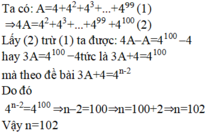Cho S = 4 + 42 + 43 + ... + 49 + 4 mũ 10. Tìm số tự nhiên x biết: 3xS+4=4x
Hãy nhập câu hỏi của bạn vào đây, nếu là tài khoản VIP, bạn sẽ được ưu tiên trả lời.


a) Ta có : 2 x : 2 2 = 2 5 nên x = 7.
b) Ta có: 3 x : 3 2 = 3 5 nên x = 7.
c) Ta có : 4 4 : 4 x = 4 2 nên x = 2.

Bài 9,
62x73+36x33=36x73+36x27=36(73+27)=36x100=3600.
197-\([\)6x(5-1)2+20220\(]\):5=197-\([\)6x16+1\(]\):5=197-97:5=197-97/5=888/5.
Bài 10,
21-4x=13
=>4x=21-13=8
=>x=8:4=2.
30:(x-3)+1=45:43=42=16
=>30:(x-3)=16-1=15
=>x-3=30:15=2
=>x=2+3=5.
(x-1)3+5x6=38
=>(x-1)3+30=38
=>(x-1)3=38-30=8=23
=>x-1=2
=>x=3.

Câu 6: Khôg có cau nào đúng
Câu 7: C
Câu 8: B
Câu 9: B
Câu 10: D

a) \(5\left(x+7\right)-10=2^3\cdot5\)
\(\Rightarrow5\left(x+7\right)-10=40\)
\(\Rightarrow5\left(x+7\right)=40+10\)
\(\Rightarrow x+7=\dfrac{50}{5}\)
\(\Rightarrow x+7=10\)
\(\Rightarrow x=10-7\)
\(\Rightarrow x=3\)
b) \(9x-2\cdot3^2=3^4\)
\(\Rightarrow9x-18=81\)
\(\Rightarrow9x=81+18\)
\(\Rightarrow9x=99\)
\(\Rightarrow x=\dfrac{99}{9}\)
\(\Rightarrow x=11\)
c) \(5^{25}\cdot5^{x-1}=5^{25}\)
\(\Rightarrow5^{x-1}=5^{25}:5^{25}\)
\(\Rightarrow5^{x-1}=1\)
\(\Rightarrow5^{x-1}=5^0\)
\(\Rightarrow x-1=0\)
\(\Rightarrow x=1\)
a) 5(�+7)−10=23⋅55(x+7)−10=23⋅5
⇒5(�+7)−10=40⇒5(x+7)−10=40
⇒5(�+7)=40+10⇒5(x+7)=40+10
⇒�+7=505⇒x+7=550
⇒�+7=10⇒x+7=10
⇒�=10−7⇒x=10−7
⇒�=3⇒x=3
b) 9�−2⋅32=349x−2⋅32=34
⇒9�−18=81⇒9x−18=81
⇒9�=81+18⇒9x=81+18
⇒9�=99⇒9x=99
⇒�=999⇒x=999
⇒�=11⇒x=11
c) 525⋅5�−1=525525⋅5x−1=525
⇒5�−1=525:525⇒5x−1=525:525
⇒5�−1=1⇒5x−1=1
⇒5�−1=50⇒5x−1=50
⇒�−1=0⇒x−1=0
⇒�=1⇒x=1

a) \(2^x:4=16\\ \Rightarrow2^x=64\\ \Rightarrow2^x=2^6\\ \Rightarrow x=6\)
b) \(4^{x-3}=256\\ \Rightarrow4^{x-3}=4^4\\ \Rightarrow x-3=4\\ \Rightarrow x=7\)
c) \(\left(2x+1\right)^3=343\\ \Rightarrow\left(2x+1\right)^3=7^3\\ \Rightarrow2x+1=7\\ \Rightarrow x=3\)
d) \(10+2x=4^5:4^3\\ \Rightarrow10+2x=16\\ \Rightarrow x=3\)
a,2^x:4=16
2^x=16.4=64
2^x=2^6
=>x=6
b,4^x-3=256
4^x-3=4^4
=>x-3=4
x=4+3=7
c,(2x+1)^3=343
(2x+1)^3=7^3
=>2x+1=7
2x=7-1=6
x=6:2=3
d,10+2x=4^5:4^3
10+2x=4^2=16
2x=16-10=6
x=6:2=3

a, 2x : 4 = 16
⇒ 2x : 22 = 24
⇒ x - 2 = 4
⇒ x = 6
b, 4x-3 = 256
⇒ 4x - 3 = 44
⇒ x - 3 = 4
⇒ x = 7
c, (2x + 1)3 = 343
⇒ (2x + 1)3 = 73
⇒ 2x + 1 = 7
⇒ 2x = 6
⇒ x = 3
d, 10 + 2x = 45 : 43
⇒ 10 + 2x = 16
⇒ 2x = 6
⇒ x = 3

\(b,A=\left(1+4+4^2\right)+\left(4^3+4^4+4^5\right)+...\left(4^{57}+4^{58}+4^{59}\right)\\ A=\left(1+4+4^2\right)+4^3\left(1+4+4^2\right)+...+4^{57}\left(1+4+4^2\right)\\ A=\left(1+4+4^2\right)\left(1+4^3+...+4^{57}\right)\\ A=21\left(1+4^3+...+4^{57}\right)⋮7\)
a: \(\Leftrightarrow2x+1\in\left\{1;3\right\}\)
hay \(x\in\left\{0;1\right\}\)

Lời giải:
$S=4^1+4^2+...+4^{10}$
$4S=4^2+4^3+...+4^{11}$
$4S-S=(4^2+4^3+...+4^{11})-(4^1+4^2+...+4^{10})$
$3S=4^{11}-4$
$3S+4=4^{11}=4^x$
$\Rightarrow x=11$